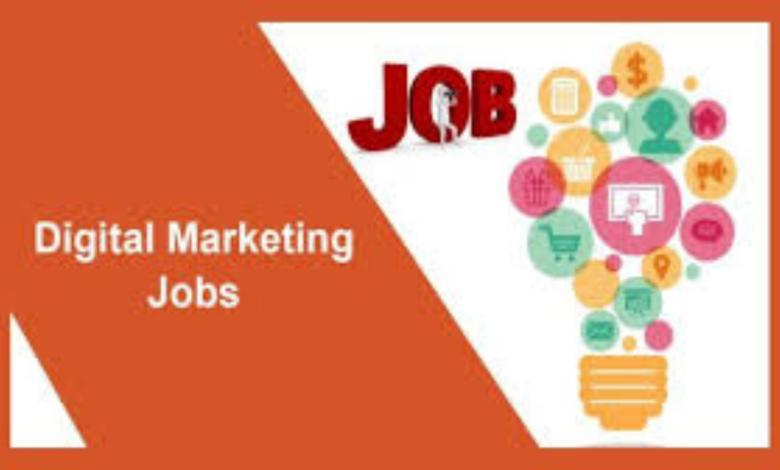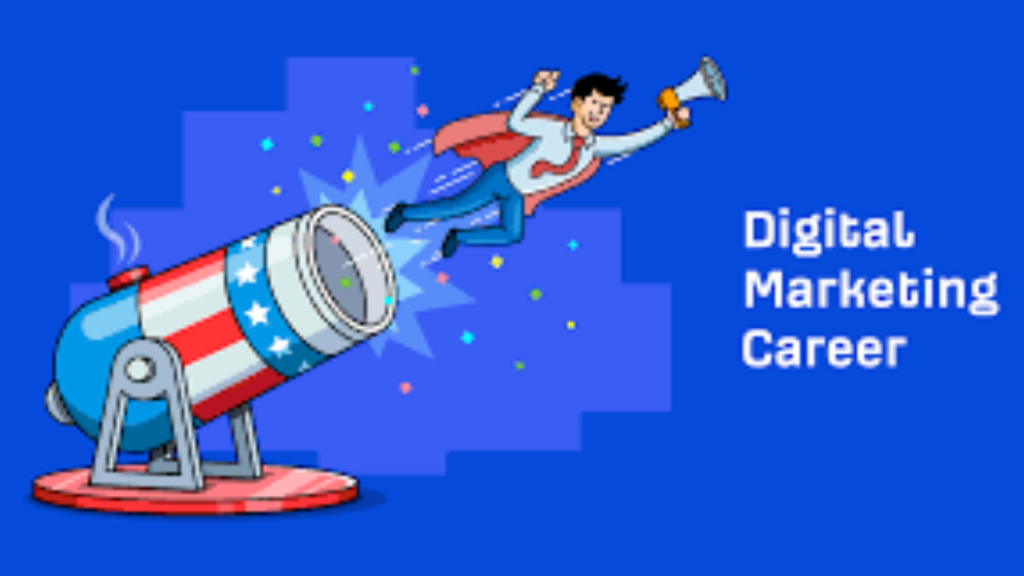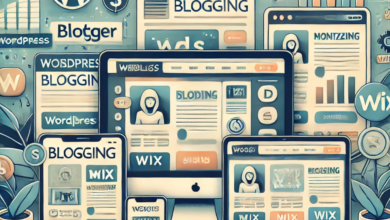Unlocking Opportunities The Ultimate Guide to Digital Marketing Jobs

Introduction
What is Digital Marketing?
Digital marketing promotes products, services, or brands using online platforms and digital channels. It encompasses many strategies, including search engine optimization (SEO), social media marketing, content marketing, email campaigns, and pay-per-click (PPC) advertising. Unlike traditional marketing, digital marketing provides measurable results and allows businesses to connect directly with their audience in real-time.
The dynamic nature of digital marketing has made it an integral part of modern business. From small startups to multinational corporations, everyone uses digital marketing to build brand awareness, engage audiences, and drive sales.
Why Pursue a Career in Digital Marketing?
The digital age has reshaped the job market, and digital marketing is one of the fastest-growing sectors. With businesses increasingly investing in online presence, the demand for skilled digital marketers is soaring. According to industry reports, the global digital marketing market is projected to grow significantly in the coming years, creating numerous job opportunities.
Digital marketing offers diverse roles, flexibility, and growth potential. Whether you’re interested in analytics, creativity, or strategy, there’s a niche for you. Additionally, many digital marketing jobs offer remote work options, making it a great career choice for those seeking work-life balance.
Understanding Digital Marketing Jobs
Key Roles in Digital Marketing
Digital marketing encompasses a variety of roles, each with unique responsibilities:
- Digital Marketing Manager: Oversees all digital marketing strategies, ensuring cohesive campaigns that meet business goals.
- SEO Specialist: Optimizes websites to rank higher in search engine results, driving organic traffic.
- Content Marketing Strategist: Focuses on creating engaging, valuable content to attract and retain customers.
- Social Media Manager: Manages social media platforms, creating posts and engaging with audiences.
- PPC/SEM Specialist: Runs paid advertising campaigns on platforms like Google Ads, ensuring high ROI.
- Email Marketing Specialist: Designs and executes email campaigns to nurture leads and retain customers.
- Affiliate Marketing Manager: Builds relationships with affiliates to drive traffic and sales through partnerships.
- Analytics and Data Specialist: Analyzes campaign data to measure success and recommend improvements.
Core Skills Required
Successful digital marketers need a mix of technical and soft skills:
- Technical Skills: Proficiency in SEO, SEM, data analytics, and digital tools like Google Analytics, HubSpot, and social media platforms.
- Creative Skills: Ability to create compelling content, develop innovative campaigns, and craft visually appealing designs.
- Soft Skills: Strong communication, adaptability, problem-solving, and teamwork.
Certifications in areas like Google Ads, HubSpot Marketing, and social media management tools are valuable for building credibility and enhancing skills.
Work Environments
Digital marketing professionals work in diverse settings:
- Agency Settings: Fast-paced environments offering varied experiences with multiple clients.
- In-House Teams: Focused on a single brand’s marketing efforts, allowing for deeper specialization.
- Freelancing and Consulting: Flexibility to work independently, often with various clients and projects.
How to Start a Career in Digital Marketing

Educational Pathways
A formal degree in marketing, business, or communications can be helpful but isn’t mandatory. Many professionals transition into digital marketing through certifications and self-learning. Online courses, like Google Digital Garage and HubSpot Academy, and platforms like Coursera offer accessible entry points into the field.
Specialized certifications like Google Ads and Facebook Blueprint provide hands-on knowledge and enhance employability. These certifications demonstrate proficiency in essential tools and techniques, making you a desirable candidate for employers.
Gaining Practical Experience
Practical experience is crucial for breaking into the digital marketing industry. Start by:
- Internships: Gain hands-on experience in real-world campaigns.
- Personal Projects: Create a blog or social media presence to demonstrate your skills.
- Networking: Attend industry events and webinars, as well as join marketing groups to build connections and find mentorship opportunities.
Freelancing platforms like Upwork and Fiverr can also help you gain experience by working on smaller projects for clients.
Building a Portfolio
A strong portfolio showcases your skills and achievements. Include:
- Case Studies: Highlight successful campaigns, detailing objectives, strategies, and outcomes.
- Creative Work: Share samples of content, ads, or designs.
- Analytics Reports: Demonstrate your ability to measure and interpret data.
An impressive portfolio sets you apart and provides tangible proof of your capabilities.
Industry Trends and Future Opportunities
Current Trends in Digital Marketing
The digital marketing landscape is constantly evolving. Key trends include:
- Personalization: Tailoring content and ads to individual preferences.
- AI-Driven Marketing: Leveraging AI tools for automated campaigns and advanced analytics.
- Voice Search Optimization: Adapting content for voice-enabled devices like Alexa and Google Assistant.
- Short-Form Video Content: Platforms like TikTok and Instagram Reels dominate audience engagement.
Emerging Technologies
Future technologies are reshaping digital marketing:
- AI and Machine Learning: Predicting customer behavior and automating repetitive tasks.
- AR/VR: Creating immersive advertising experiences.
- Blockchain: Enhancing transparency and security in digital ads.
- Automation Tools: Streamlining workflows and boosting efficiency.
Staying updated with these advancements is essential for long-term career growth.
Career Growth and Long-Term Opportunities
Digital marketing offers extensive growth potential. As you gain experience, you can:
- Transition into leadership roles, like Marketing Director.
- Specialize in niches like e-commerce or mobile marketing.
- Explore related fields such as UX design or product management.
Continuous learning and upskilling ensure you remain competitive in this ever-changing industry.
Challenges and Tips for Success in Digital Marketing Careers
Common Challenges
Digital marketing professionals often face challenges such as:
- Keeping up with rapidly changing trends and technologies.
- Managing multiple campaigns and platforms simultaneously.
- Balancing creativity with data-driven strategies.
Overcoming these hurdles requires dedication, adaptability, and strategic thinking.
Tips for Excelling in Digital Marketing
- Stay Updated: Follow industry blogs, podcasts, and webinars to stay ahead of trends.
- Experiment and Innovate: Test new tools and strategies to find what works best.
- Build Relationships: Collaborate with clients and teams to foster trust and creativity.
- Focus on ROI: Prioritize measurable results to showcase the impact of your campaigns.
Conclusion
Digital marketing is a thriving field with abundant opportunities for those willing to learn and adapt. From creative roles to analytical positions, there’s something for everyone. With the right skills, experience, and determination, you can build a rewarding career in digital marketing and make a meaningful impact in the digital world.
FAQs
What qualifications are needed for digital marketing jobs?
While a degree in marketing or business helps, certifications and practical experience are highly valued.
How much can I earn as a digital marketer?
Salaries vary by role and experience, with entry-level roles starting at $40,000 and senior positions exceeding $100,000 annually.
What are the best certifications for digital marketing?
Google Ads, HubSpot Marketing, and Facebook Blueprint are among the most recognized certifications.
Is digital marketing a promising career for beginners?
Yes, it offers entry-level opportunities and the potential for rapid career growth.
What tools should I learn to become a digital marketer?
Tools like Google Analytics, SEMrush, Hootsuite, and Canva are essential for various roles.
How can I transition to digital marketing from a different field?
Start with online courses, gain practical experience, and build a strong portfolio.
What is the future of digital marketing jobs?
The field is expected to grow significantly, with roles focusing on AI, automation, and immersive experiences.
Are remote digital marketing jobs typical?
Yes, many digital marketing roles offer remote work opportunities.
How do I choose the right specialization in digital marketing?
Assess your strengths and interests to decide between SEO, social media, or analytics.
What are the most in-demand skills in digital marketing?
SEO, data analytics, content marketing, and proficiency in digital tools are highly sought after.




